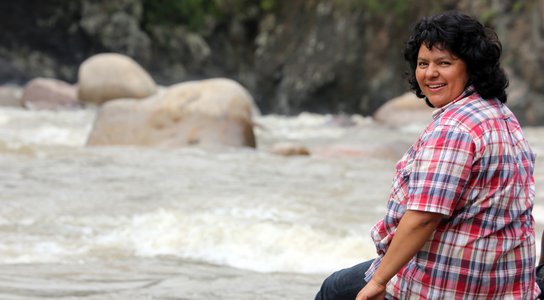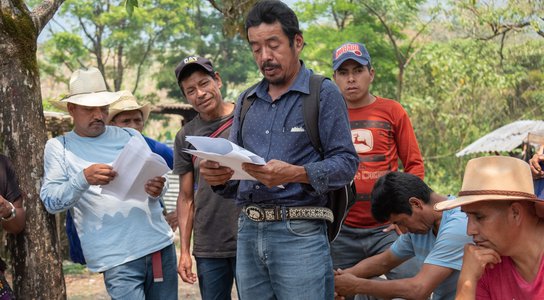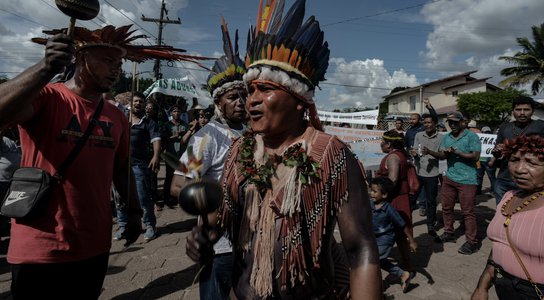Women land and environmental defenders are absolutely vital to the fight against the climate crisis. In every region of the world, women defenders take leadership roles in action against mining, logging, agribusiness and other destructive industries.
Historically, women defenders have to fight a battle on two fronts: the public struggle to protect their land, water and our planet, and the often invisible struggle to defend their right to speak within their communities and families. In many parts of the world, they’re still excluded from land ownership and discussions about the future of their communities’ natural resources.
Too often, they are also subject to sexual violence while they also risk their lives for standing up to destruction.
That’s why on International Women’s Day, we celebrate defenders who have inspired us, those who keep challenging powerful corporations and governments across the globe. Of course there are many more across the globe and this is a tribute to them too. These women are leading us towards a better, more sustainable, future for our planet and governments have a duty to help protect them.
Berta Cáceres (1971-2016), Honduras
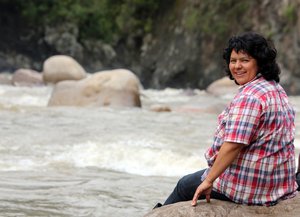
Goldman Environmental Prize
Berta Cáceres dedicated several years to protecting her community’s land in Intibucá, western Honduras, from the construction of the dam which threatened a vital and sacred water source for the indigenous Lenca people. On 2 March 2016, armed men broke into Berta’s home in the middle of the night and shot her dead. Less than a year before her death, Berta had delivered a moving address to a packed auditorium as she was presented with the 2015 Goldman Environmental Prize for exceptional bravery in environmental activism. She dedicated her award to “the martyrs who gave their lives in the struggle to defend our natural resources.” Berta said, “Mother Nature – militarised, fenced-in, poisoned – demands that we take action”
Berta co-founded an organisation, COPINH (the Civic Council of Popular and Indigenous Organisations of Honduras), and successfully ran a grassroots campaign against the dam. She brought together members of her community, organised a local assembly, led a protest and filed complaints with government authorities.
COPINH continues her legacy by working against irresponsible development and calling for justice for Berta’s murder.
Derek Cabe, Coal-Free Bataan Movement, The Philippines
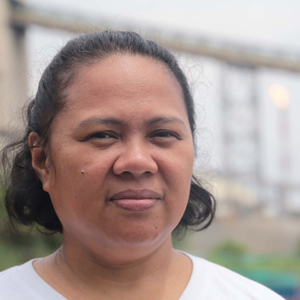
Since the coal boom arrived in The Philippines’ Bataan region - located just over the bay from Manila - residents have been speaking out against pollution affecting their health and the water supply. Community members have also faced displacement and seen their homes demolished. Derek Cabe, as coordinator at the Coal-Free Bataan Movement, has been helping to organise community members with these complaints and who want to have a voice, bringing them together to help protect clean air and the environment. In particular, the movement has been campaigning against a dirty-power plant situated right on the seafront, therefore affecting many fishermen’s livelihoods.
‘If they did not fight, if they did not have an organization, they won't have a fighting chance. This is where the importance of organizing is. The people are learning to protect human rights,’ says Derek, ‘Defending their rights is important because it's their right to breathe in the first place. It's everybody's right to breathe.
Derek and other anti-coal activists in the region experience harassment, intimidation and attacks. Tragically, Gloria Capitan, an activist and grandmother in the region, was shot dead outside her karaoke bar in 2016.
Quitting is not an option. Will the air be clean again if we stop? - Derek Cabe
Gillian Kelly, Frack Free Lancashire, United Kingdom
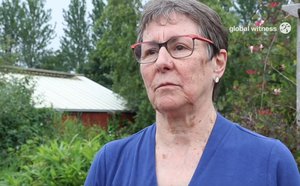
Seventy-five-year-old grandmother Gillian Kelly, from Lancashire, UK, is part of a group of protestors who have been fighting for the last two years to stop shale gas extraction (fracking) from destroying their rural village community. In 2017, Gillian and several members of her family were arrested for creating a human shield to stop machinery from entering a fracking site.
But she has no regrets: “I have little grandchildren – very little grandchildren – and I can’t bear to think about their future,” she says. “I don’t even know if we still have a window left. But we have to do something, I have to do something.’
Many anti-fracking activists have found themselves targeted by an industry bent on silencing them, and that is using the courts to do so. In the most high-profile case in the UK, three activists known as the `fracking three’ were sentenced to prison for more than a year each using a draconian law that dates back to Medieval times for blocking another fracking site.
Gillian says she decided to stand up for the environment and against the damaging effects of fossil fuel extraction because of her love of nature - despite the risks of criminalisation.
Since Gillian’s arrest, activity by the fracking industry in the Northwest of England has been followed by multiple earthquakes and garnered wide media interest. But in November 2019, activists celebrated as the UK Government called a halt to fracking in England amid fears about earthquakes.
Krystal Two Bulls, Organiser at About Face and Director/Founder at Voices of the Sacred, United States
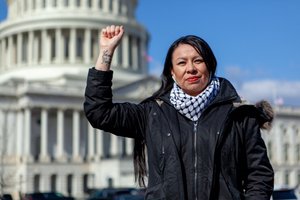
Valentina Stackl / EarthRights International
In 2016, the Standing Rock Sioux Tribe’s peaceful protest against the proposal of a crude oil pipeline running through their sacred lands captured worldwide media attention. Krystal Two Bulls was there, and stood as a Water and Land Protector. She also founded Voices of the Sacred, an indigenous youth organisation.
Krystal became the target of legal attacks by a major energy company for speaking out against the Dakota Access Pipeline, which put the Standing Rock Sioux Tribe’s drinking water at risk of contamination. Costly legal suits are being used around the world to try and silence and intimidate environmental defenders.
“The systems we live in were not designed to empower all people, it was designed to empower some people, people at the top, people with money," says Krystal, "So for me all these different fights we see happening in all these organizing spaces across the world, they’re all interconnected, they have their roots in colonization, roots in capitalism and corporatism and so to me it’s the same fight.
“Land defenders that are actually in their communities need to be invested in and their voices need to be the ones that are guiding and directing what all of these other NGOs and government agencies are doing, because we are the ones who are getting the impacts first.
"I think centering our voices… to be able to do the job that we were put here to do, which is steward this land, I think that is the only way forward."
Ercilia Perez, Peaceful Resistance of Ixquisis movement, Guatemala
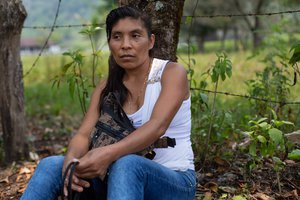
James Rodriguez
Guatemala is one of the deadliest countries to defend the environment – in 2018 at least 16 land and environmental defenders were killed when standing up to destructive industries. Ercilia is part of an indigenous women’s organisation protecting their land and the environment in Guatemala. The group also discuss the added challenges women face when they speak out against destructive projects.
Her community has been standing up to destructive hydroelectric projects in their area, which she says has affected the river running through their ancestral lands. Ercilia says the projects have affected their food and water supply. But since the community started protesting, at least three people have been killed and many more criminalised for peaceful actions.
‘‘Since the company came to bring problems, well, things are different now. We cannot go out alone anymore. If our husbands go, then we go. We cannot go far any more. And this is a big problem that affects us."
Despite the threats, Ercilia says the community will keep voicing their demands.
"What we want to tell the government is to please take our petitions, from our women, into account. Because we, the women, are important too. We have the same dignity as men. Government, all women here fighting are calling for your help. We are a women’s organisation."
